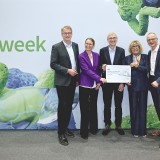Notes to Editors
For further information or to arrange an expert interview, please contact [email protected].
We kindly ask that a reference to UEG Week 2024 is included when communicating any information within this press release.
Key terms defined
The ReCET procedure is an endoscopic treatment that employs electroporation to ablate the duodenal mucosa. Electroporation creates small, irreversible holes in the cell membranes, leading to apoptosis, or natural cell death. This method can be precisely controlled for depth and avoids generating heat, thereby preventing damage to the deeper wall layers—a common challenge with standard endoscopic ablation techniques. Importantly, this treatment enhances the body’s sensitivity to endogenous insulin, although the precise mechanism behind this effect remains under investigation.
Type 2 diabetes (T2D) is the most prevalent form of diabetes, characterised by elevated blood sugar, or glucose, levels. In healthy individuals, the hormone insulin facilitates the transfer of glucose from the bloodstream into cells, where it is used for energy. However, in individuals with T2D, the body’s cells become resistant to insulin, resulting in persistently high blood glucose levels and inadequate energy absorption. This can lead to symptoms such as fatigue, excessive thirst, frequent urination, blurred vision, and constant hunger. If left untreated, prolonged high blood glucose levels can lead to severe complications, including kidney disease, gum disease, heart attack, or stroke.
About the Author
Celine Busch graduated with a degree in Medicine from the University of Amsterdam in December 2020. She started her PhD in 2021 under the supervision of professors Jacques Bergman and Max Nieuwdorp. Her research focuses on endoscopic duodenal ablation as a treatment for type 2 diabetes. Celine aims to become a gastroenterologist.
About UEG
Founded in 1992, United European Gastroenterology (UEG) is the leading non-profit organisation for excellence in digestive health in Europe and beyond with its headquarters in Vienna. We improve the prevention and care of digestive diseases in Europe through providing top tier education, supporting research and advancing clinical standards. As Europe’s home for multidisciplinary gastroenterology, we unite over 50,000 engaged professionals from national and specialist societies, individual digestive health experts and related scientists from all fields. With our innovative online platform, the ‘myUEG Community’, we enable digestive health professionals from across the globe to connect and benefit from a plethora of outstanding free resources and educational activities. Our offers include UEG Week, our annual congress, online and face-to-face educational experiences, research support, a scientific journal and a range of opportunities in the form of fellowships and grants. We provide numerous guidelines, standards and quality improvement initiatives and campaign at the European level to ensure continued resources for research into digestive health while working closely with patient organisations. Find out more about UEG’s work by visiting: www.ueg.eu.





Please log in with your myUEG account to post comments.